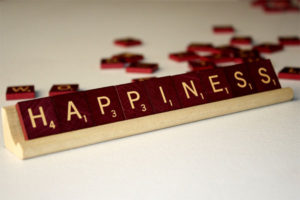Perhaps the most famous line in our Declaration of Independence states: “We hold these truths to be self-evident, that all men are created equal, that they are endowed by their Creator with certain unalienable rights that among these are life, liberty, and the pursuit of happiness.” A 2016 Harris poll suggests that we are not doing so well in the happiness department. We scored a 31 out of a possible 100, down from 34 the prior year. Our relatively low level of happiness may seem counterintuitive given the fact that we count ourselves among the wealthiest nations in the world. But perhaps the old adage is true: Money doesn’t buy happiness.
So what makes people happy?
 Dr. Mihaly Csíkszentmihályi, PhD, a Distinguished Professor of Psychology and Management at Claremont Graduate University, has spent his career exploring that very question. He is a leading researcher in positive psychology and is renowned for his seminal work entitled Flow: The Psychology of Optimal Experience. This post presents key concepts from that oft-cited book.
Dr. Mihaly Csíkszentmihályi, PhD, a Distinguished Professor of Psychology and Management at Claremont Graduate University, has spent his career exploring that very question. He is a leading researcher in positive psychology and is renowned for his seminal work entitled Flow: The Psychology of Optimal Experience. This post presents key concepts from that oft-cited book.
Happiness isn’t about the wealth we amass, the things we collect, or the accolades that accrue to our names. It’s about inner harmony. It’s defined by our capacity to take action in ways that allow us to harvest the genuine rewards of living.
People are happiest when they are in a state of “flow.” This state happens when we are fully engrossed in voluntary activities that stretch our bodies and/or minds to accomplish something worthwhile. These experiences share most (if not all) of the following characteristics:
- They involve tasks that we reasonably believe we have the chance to complete.
- We have the ability to concentrate on what we are doing because the task has clear goals and provides immediate feedback.
- We act with such deep and effortless involvement that we temporarily let go of our everyday worries, responsibilities, and frustrations.
- We feel some sense of control over our actions. We may not actually BE in control, but we know that we can control how we feel and respond to the situation at hand.
- Our ego disappears in the moment.
- The sense of time is altered. Hours can seem like minutes.
Some describe this sensation as being “in the zone.” They’re moments when we’re fueled by the subjective rewards of doing things, not the promise of recognition for our achievements. And while we tend to lose ourselves in the moment, we often gain a stronger sense of self after the experience ends. We’re enriched by new skills and fresh achievements that increase our self-confidence and encourage pursuit of new and interesting challenges.
Note that the flow experience must arise from voluntary action. When we feel that we are engaged in a task against our will, we deplete our psychic energy. That being said, each of us may need to take on seemingly unpleasant tasks from time to time. I find that substituting the phrase “I choose to…” rather than “I have to…” transforms the experience. I’m clear about my motivation and the consequences of inaction. As such, I don’t squander (as much) energy grumbling about it or devolving into victimhood.
“Someone who is in harmony no matter what he does, no matter what is happening to him, knows that his psychic energy is not being wasted on doubt, regret, guilt, and fear, but is always usefully employed. Inner congruence ultimately leads to that inner strength and serenity we admire in people who seem to have come to terms with themselves.”
– Dr. Mihaly Csíkszentmihályi, PhD
When facing adversity, Dr. Csíkszentmihályi recommends a confident yet egoless response. Find ways to function harmoniously within the present environment rather than express dominance over it. Pay attention to what’s happening in the world at large, not your perception of your own needs or your socially conditioned desires. Discover new solutions by focusing on worthy goals and moving obstacles out of the way.
Finally, Dr. Csíkszentmihályi offers this simple formula for cultivating “flow”:
- Set worthwhile goals.
- Find ways to measure progress.
- Become immersed in the activity; pay attention to what’s happening and learn to enjoy the immediate experience.
- Develop new skills.
- Raise the stakes if the activity becomes boring.